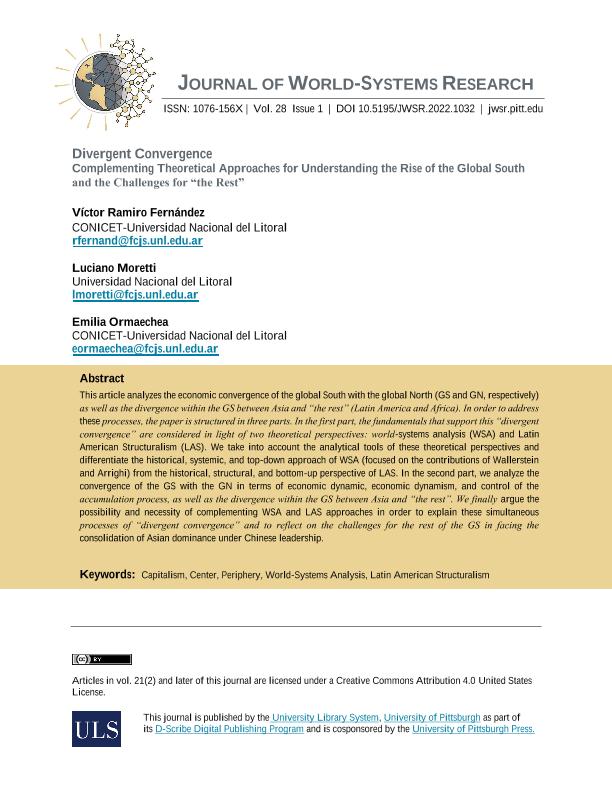Artículo
Complementing Theoretical Approaches for Understanding the Rise of the Global South and the Challenges for “the Rest”
Fecha de publicación:
03/2022
Editorial:
University of Pittsburgh
Revista:
Journal of World-Systems Research
e-ISSN:
1076-156X
Idioma:
Inglés
Tipo de recurso:
Artículo publicado
Clasificación temática:
Resumen
This article analyzes the economic convergence of the global South with the global North (GS and GN, respectively) as well as the divergence within the GS between Asia and “the rest” (Latin America and Africa). In order to address these processes, the paper is structured in three parts. In the first part, the fundamentals that support this “divergent convergence” are considered in light of two theoretical perspectives: world-systems analysis (WSA) and Latin American Structuralism (LAS). We take into account the analytical tools of these theoretical perspectives and differentiate the historical, systemic, and top-down approach of WSA (focused on the contributions of Wallerstein and Arrighi) from the historical, structural, and bottom-up perspective of LAS. In the second part, we analyze the convergence of the GS with the GN in terms of economic dynamic, economic dynamism, and control of the accumulation process, as well as the divergence within the GS between Asia and “the rest”. We finally argue the possibility and necessity of complementing WSA and LAS approaches in order to explain these simultaneous processes of “divergent convergence” and to reflect on the challenges for the rest of the GS in facing the consolidation of Asian dominance under Chinese leadership.
Archivos asociados
Licencia
Identificadores
Colecciones
Articulos(IHUCSO LITORAL)
Articulos de INSTITUTO DE HUMANIDADES Y CIENCIAS SOCIALES DEL LITORAL
Articulos de INSTITUTO DE HUMANIDADES Y CIENCIAS SOCIALES DEL LITORAL
Citación
Fernández, Víctor Ramiro; Moretti, Luciano; Ormaechea, Emilia Laura; Complementing Theoretical Approaches for Understanding the Rise of the Global South and the Challenges for “the Rest”; University of Pittsburgh; Journal of World-Systems Research; 28; 1; 3-2022; 98-126
Compartir




